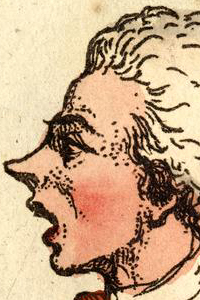William Pitt the Younger

Pitt, William the Younger: (1759-1806) British statesman; 2nd son of William Pitt, 1st earl of Chatham. Trained as a lawyer, he entered Parliament in 1781 and in 1782 at the age of 23 became Chancellor of the Exchequer under Lord Shelburne. At the fall (1783) of the coalition government of Lord North and Charles James Fox, who was to be Pitt's lifelong rival, Pitt was made Prime Minister by George III. He overcame strong opposition in Parliament, where the king's interference was sharply resented, and a long-postponed general election (1784) gave him a parliamentary majority. Pitt's policies included reduced expenditures, new taxes to decrease the national debt, and lower customs duties in accordance with the theories of Adam Smith. He also advocated parliamentary reform but failed (1785) to secure Parliament's approval of it. His India Act (1784) strengthened the government's powers there but left patronage in the hands of the East India Company. His Constitutional Act (1791) divided Canada into Upper and Lower Canada and sanctioned the institutions of the French Canadians in the latter province. Pitt's popularity increased steadily; when the king became temporarily insane (1788-89), the Prime Minister was able, despite the efforts of Fox, to prevent the establishment of an unlimited regency and remain in office. His liberal policies ended when Great Britain became involved in the French Revolutionary Wars, followed by the Napoleonic Wars. When the French Revolution began (1789), Pitt's desire was for peace and neutrality, and after France finally declared war (1793) on Britain, he failed to foresee either the length or the seriousness of the conflict. Within Great Britain he suspended (1794) habeas corpus and enacted other repressive legislation to halt radical agitation. His military coalitions against France (1793 and 1798) were unsuccessful on land, although the British navy won some overwhelming victories, and his financial support of Britain's allies brought on a monetary crisis. Rebellion in Ireland hampered the war effort and convinced Pitt that the solution to the Irish problem lay in the parliamentary union of Ireland with England, accompanied by Catholic Emancipation, so that Roman Catholics might hold office. The union was achieved (1800) by wholesale bribery, but the king then refused to approve Catholic Emancipation, and Pitt resigned (1801). He was recalled (1804) as Prime Minister to repel an expected invasion by Napoleon, which never materialized. He organized a third coalition against France, but Horatio Nelson's great naval victory at Trafalgar was soon followed by the defeat of Britain's allies at Austerlitz (1805). The latter news is said to have hastened Pitt's death.
